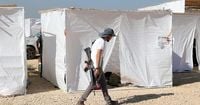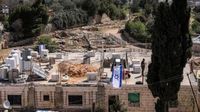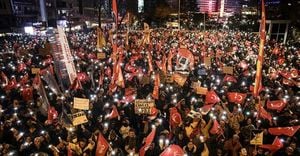The controversy surrounding the Dutch organization Christenen voor Israël (CvI) deepened as it announced an investigation into its funding of projects on the West Bank, significantly suspending aid during the inquiry. This decision follows revelations that funds may have been diverted toward purchasing weapons for Israeli settlers living in illegal settlements, specifically linked to donations made to Or Ami, a foundation supporting these settlers. The shocking development arises from an undercover investigation by Investico, in collaboration with the Nederlands Dagblad and the BNNVARA program BOOS, which shed light on the possible misuse of donations.
Since the group's formation, CvI has vigorously maintained its stance against violence and weapon financing. However, after the Hamas attack on October 7, 2023, it quickly established an emergency fund, directing at least 43,000 euros to three foundations on the West Bank for security clothing and camera equipment. A spokesperson for CvI insisted, "We do not support violence or financing of weapons and have suspended funding to Or Ami as a precaution during this investigation." The organization further disclosed that an additional 25,000 euros had gone to another foundation on the West Bank for bomb shelter construction and protective clothing.
In terms of recent financial commitments, it was revealed that CvI had donated 300,000 euros for constructing a new neighborhood in the illegal Israeli settlement of Revava. This particular development, noted to violate both international and Israeli law, was already under a demolition order from Israeli authorities in 2022. The spokesperson for CvI, Sara van Oordt, acknowledged that they were aware of claims by a Palestinian farmer regarding land ownership and stated, “If the judge determines that the land rightfully belongs to that Palestinian, we will relocate the houses.”
According to the ongoing investigation, CvI's funding practices have been significantly at odds with Dutch and European Union policies aimed at promoting peace in the region. The legal implications of their support for the expansion of illegal settlements have drawn criticism from various organizations and the Dutch government, which has reiterated its position against constructing such settlements on occupied territory.
Van Oordt defended the organization’s practices, noting that while they have collaborated with other Zionist organizations, it’s crucial to delineate between their humanitarian efforts and any allegations of funding violence. Following the revelations, CvI declared a total halt to their partnership with Israel Heartland, an organization said to provide weapons directly to settlers.
Tim Hofman, the host of the BNNVARA program BOOS, highlighted in a recent episode how funds raised in the Netherlands may also inadvertently support violent settlers. Hofman’s team conducted an undercover investigation, revealing the troubling links between CvI and assertive settlement policies on the West Bank, particularly within areas adjacent to Palestinian farmland.
During this time, CvI's funding towards military-grade protective equipment has come under scrutiny. Reports indicate that part of the funds allocated from the emergency donations were intended for cameras and security gear, yet the looming question remains if any of this financing could support a violent militia culture.
The spokesperson of the Ministry of Foreign Affairs in the Netherlands expressed concern about the involvement of Dutch organizations in illegal housing construction in disputed territories, urging a reconsideration of the support extended to such projects. This aspect of the controversy further complicates CvI's position as it navigates the growing backlash against perceived complicity in international law violations.
Amidst the rising tensions and calls for accountability, CvI insists that any funds related to weapons purchases have been mischaracterized. “We have never supported violence, nor do we condone actions that go against humanitarian principles,” stated a representative from CvI, reinforcing their commitment towards solely humanitarian outreach.
This crisis reveals a broader discourse regarding the intersection of faith, politics, and international relations in the ongoing Israeli-Palestinian conflict. As the legal and ethical implications of funding practices are brought to the forefront, it remains to be seen how CvI will respond to these challenges moving forward.
In a landscape where organizations operate within morally gray areas, the accountability of charitable donations becomes crucial, not just for the facilitating organizations but also for the very communities they aim to assist. The coming weeks will be pivotal in determining the future of CvI’s operations and its overall contribution to the ongoing conflict in the region.








